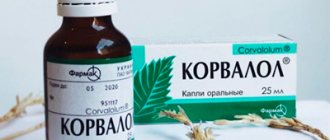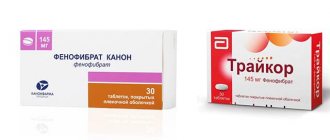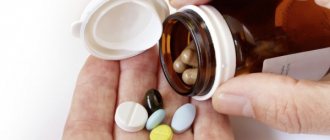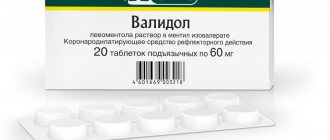During pregnancy, a woman becomes suspicious and impressionable. This is explained by the fact that hormonal changes occur in her body. Expectant mothers often suffer from stressful conditions, neuroses that cause heart pain, insomnia, and stomach or intestinal spasms. Corvalol successfully copes with all these problems.
A complex drug with a pronounced sedative, vasodilator, antispasmodic effect called Corvalol is extremely popular. The drug quickly exhibits a therapeutic effect and is inexpensive. Expectant mothers are interested in the question of whether Corvalol can be used during pregnancy. This will be discussed further.
Corvalol - descriptive characteristics
Corvalol is a complex drug with a pronounced sedative effect. The medicine is produced in the form of tablets and tinctures.
The combined drug allows you to get rid of neuroses, insomnia, intestinal spasms
Main components:
- α-bromoisovaleric acid ethyl ester;
- phenobarbital;
- menthol oil.
Additional substances include sodium hydroxide, ethanol (96%), filtered water, etc. These ingredients enhance the effect of the active ingredients.
Indications for use of the drug:
- Neuroses, increased irritability.
- Insomnia.
- Cardiopsychoneurosis.
- Initial stages of arterial hypertension.
- Unexpressed spasms of the heart vessels.
- Increased heart rate.
- Intestinal spasms due to neurovegetative disorders.
In addition, the medicine is used for herpes (early stage). However, doctors do not approve of this method of treatment, especially for expectant mothers. This is explained by the fact that the drug eliminates the external manifestations of the disease, while the infection itself is in the body, which is very dangerous for the fetus.
Drops and tablets are taken orally. The pills are washed down with water, and the tincture is first diluted or dripped onto a piece of sugar. The decision to choose a dosage form and determine the dosage is made by the doctor for each patient individually.
Many expectant mothers are interested in the question: “Is Corvalol ok during pregnancy or not?” According to the instructions, the drug is contraindicated during pregnancy and breastfeeding. In addition, the medication should not be used in case of hypersensitivity to its substances, hepatic porphyria, liver disease, kidney disease, or functional heart failure.
Corvalol drops contain ethanol, which negatively affects the development of the fetus, especially in the early stages of pregnancy. And phenobarbital, as a result of long-term use, provokes medical dependence. The patient is forced to constantly increase the dosage of the medicine, as the usual one becomes ineffective. In addition, this component inhibits the activity of the nervous system, and as a result, the mental development of the child is disrupted. It is for these and many other reasons that the drug is not recommended for expectant mothers.
Mild variant of coronavirus infection
The main signs are: catarrhal symptoms (cough, swelling of the mucous membranes, nasal discharge, mild general malaise), absence or low body temperature, absence of signs of respiratory failure. In this variant of the course of the disease, most therapeutic measures will be symptomatic; most often, therapeutic doctors recommend physical rest, drinking plenty of fluids and self-isolation. In this case, taking psychotropic medications is not contraindicated.
Pros and cons of the medication
Corvalol, like any other medication, is not safe for pregnant women. The drug has both advantages and disadvantages.
Corvalol is dangerous for expectant mothers
Pros of Corvalol:
- The drug helps fight sleep disorders, anxiety, restlessness; all these symptoms are typical for pregnant women.
- Corvalol quickly relieves signs of tachycardia that occur due to stress.
- The medicine lowers blood pressure, and therefore it is used in the early stages of hypertension instead of antihypertensive drugs.
- Corvalol quickly relaxes smooth muscles, eliminates stomach or intestinal spasms that occur against the background of nervous disorders.
- The drug is available without a prescription, is inexpensive, and works quickly.
Cons of Corvalol:
- Phenobrabital and ethyl alcohol disrupt the development of the fetus and cause drug dependence in the mother.
- The drug has an impressive list of adverse reactions: nausea, vomiting, drowsiness, allergies, confusion, speech disorders, etc.
- An overdose of small doses of the drug increases the likelihood of bromism (chronic bromine poisoning).
- Drops before birth can cause fetal hypoxia.
- After taking the tincture by a pregnant woman, the tone of the uterus may increase, which threatens placental abruption and fetal death.
- If the dose of the drug is significantly exceeded, death is possible.
Based on the above information, the disadvantages of Corvalol are more significant than its advantages. For this reason, doctors recommend that pregnant women use safer sedatives.
Corvalol in the first trimester
It is most dangerous to take Corvalol during early pregnancy. The components of the drug pass through the placental barrier and disrupt the development of the fetus during the formation of its main organs and systems.
In the 1st trimester, Corvalol disrupts fetal development
Consequences of taking the drug before the 13th week of pregnancy:
- Impaired functionality of the nervous system.
- Hormonal imbalance.
- The likelihood of epileptic seizures.
- Congenital pathologies.
- Congenital changes in the structures of the heart, due to which blood circulation is impaired.
As you can see, the negative effect of Corvalol on the fetus is quite serious, and therefore doctors strongly recommend choosing safe drugs to eliminate neuroses. Expectant mothers should remember that there are safer relaxation methods; they will be described in more detail below.
Application of Corvalol
The method of administration of the drug is oral, it is consumed before meals.
If there is an urgent need, then Corvalol can be taken during pregnancy, but only in rare cases. If the expectant mother uses a sedative to calm her nerves 2 or 3 times, then it will not harm the fetus. However, this rule applies if women take it after the 13th week of pregnancy.
The tablets are washed down with water, and the drops are pre-diluted
In emergency cases, you can drink Corvalol in case of tachycardia or convulsions, in which case the dosage is from 40 to 50 drops. Although during pregnancy, the lower the dose, the better. Rarely when you need to undergo a therapeutic course, drink the tincture before meals, no more than 30 drops 3 times a day.
Many pregnant patients believe that Corvalol tablets are safer than tincture, but this opinion is erroneous. This dosage form contains the same harmful components as the drops (with the exception of additional substances). Therefore, the tablets have the same contraindications as the liquid form of Corvalol. In case of urgent need, take 2 or 3 tablets, the maximum daily dose is 6 pieces.
Is it possible for pregnant women to have dental x-rays?
Pregnancy is not considered a contraindication for dental radiography. Images are taken using computer radiovisiographs, which deliver a very small dose of radiation. The woman’s body is covered with a special protective apron, and the radiation beam is directed towards the jaw area.
However, such a procedure should be performed only when absolutely necessary and should be limited to taking pictures of one or two teeth. Long-term planned treatment, which periodically requires radiography, is best postponed until the birth of the child and completion of breastfeeding.
Precautionary measures
Before using the medicine, a pregnant woman should carefully study the instructions, especially paying attention to contraindications:
- Intolerance to the components of Corvalol.
- Functional disorders of the liver and kidneys.
- Hypolactasia (while taking pills).
- Pregnancy and lactation.
After taking Corvalol to a pregnant woman, the likelihood of negative effects increases
If the patient took the drug for a long time or independently increased the dose, then the likelihood of a negative effect of Corvalol on the fetus increases:
- dysfunction of the central nervous system;
- sleep disorders, frequent stress in the child;
- congenital heart defects;
- congenital pathologies, for example, cleft lip.
In addition, the drug is unsafe for the expectant mother, because when used systematically, it has the opposite effect:
- sleep disorders will worsen;
- the activity of the central nervous system is further inhibited;
- drug dependence develops;
- the likelihood of developing more severe nervous disorders increases;
- the woman becomes more irritable and worried.
Thus, Corvalol does more harm than good, for this reason it is worth abandoning this drug during pregnancy and breastfeeding.
Moderate and severe variants of coronavirus infection
To the above symptoms are added: respiratory failure (including increasing), increased respiratory rate, drop in blood oxygen saturation (saturation), high body temperature (more than 39.0 ° C) that does not subside for a long time, rapid pulse, unstable blood pressure. This condition is especially dangerous in elderly people (over 65 years old) or people with chronic diseases (diabetes mellitus, arterial hypertension, chronic obstructive pulmonary disease, etc.). At the moment, there are no drugs for specific prevention or treatment of coronavirus infection. Treatment consists of supportive care aimed at compensating for respiratory failure and relieving symptoms of the disease. In case of severe disease, patients are placed in specialized hospitals, where they are under the supervision of infectious disease specialists/reanimatologists. In such cases, psychotropic medications may be discontinued or the dosage reduced.
According to the Ministry of Health of the Russian Federation, the number of drugs recommended for the treatment of coronavirus includes antimalarial drugs and drugs based on interferons. However, at the moment they are not drugs with sufficient evidence of effectiveness in the treatment of coronavirus infection. Antimalarial drugs have a certain interaction with almost all psychotropic drugs: they reduce the antiepileptic activity of a number of antiepileptic drugs, prolong QT intervals on the ECG, and reduce or increase blood pressure. This interaction is not observed with all psychotropic drugs. They are generally highly compatible with current antiviral and antibacterial drugs.
It is important for a patient with an endogenous disease and symptoms of COVID-19 who is receiving psychotropic therapy to warn the attending psychiatrist (to adjust drug dosages) and the infectious disease specialist/reanimatologist about the use of psychotropic drugs.
It should be noted that most psychotropic drugs can cause withdrawal syndrome (the body's reaction that occurs when the drug is stopped or reduced and is manifested by a deterioration in the patient's condition until the symptoms of the endogenous disease return completely). Therefore, the decision to adjust the dosage of drugs or completely discontinue it must be made only under the clear guidance of the attending physician.
Thus, if a patient has a coronavirus infection and is taking psychotropic medications, each individual case of the disease should be considered by doctors on an individual basis and treatment is carried out in collaboration with psychiatrists and infectious disease specialists/reanimatologists to minimize side effects from joint use of drugs and prevent the risk of exacerbation of the endogenous disease . It may be necessary to consult a psychiatrist in advance to coordinate the patient’s action if he or she is suspected of having a coronavirus infection.











